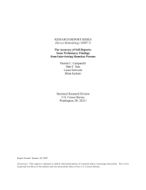
An official website of the United States government
Here’s how you know
Official websites use .gov
A .gov website belongs to an official government organization in the United States.
Secure .gov websites use HTTPS
A lock (
) or https:// means you’ve safely connected to the .gov website. Share sensitive information only on official, secure websites.
-
//
- Census.gov /
- Library /
- Census Working Papers /
- Some Preliminary Findings from Interviewing Homeless Persons
The Accuracy of Self-Reports: Some Preliminary Findings from Interviewing Homeless Persons
The Accuracy of Self-Reports: Some Preliminary Findings from Interviewing Homeless Persons
Abstract
Many factors may play a role in the accuracy of answers given by respondents. For example, response problems can be magnified if respondents have significant reasons for hiding or distorting their true answers or see little value in cooperating. Studies that try to distinguish homeless persons from those who are domiciled often use self-reported status to a series of screening questions as the basis for determining whom to interview. The accuracy of the answers to such questions, therefore, has an impact on both the count and distribution of characteristics obtained for homeless persons.
As part of a special Census Bureau research program conducted for the 1990 census to design alternative procedures for enumerating the homeless population, two aspects of data accuracy were examined: the accuracy of homeless persons’ responses about where they had slept the previous night and about whether they had already been interviewed. Preliminary results suggest that procedures to guard against duplicate interviews which rely on respondents to volunteer that they have been interviewed before do not work very well in this population, particularly if respondents are being interviewed while standing in a line to obtain food. Some respondents also may not provide accurate information about the type of location in which they slept the night before the interview. Screening procedures typically used to distinguish the “homeless” from the “domiciled” and/or “shelter users” from “street users” may need further refinement.
Others in Series
Working Paper
Working Paper
Working Paper
Share
Related Information
Some content on this site is available in several different electronic formats. Some of the files may require a plug-in or additional software to view.
 Yes
Yes
 No
NoComments or suggestions?


Top

